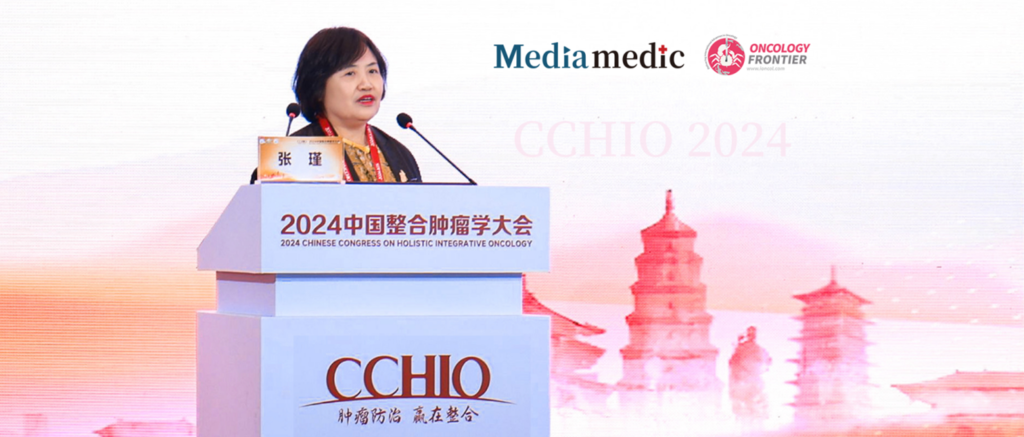
Editor’s Note: From November 15 to 17, 2024, the Chinese Congress on Holistic Integrative Oncology (CCHIO)(CCHIO) was held in Xi’an under the theme "Winning in Integration: Tumor Prevention and Treatment." In the breast cancer domain, the conference integrated the latest global advancements in diagnosis, treatment, and research. At the event, Oncology Frontier interviewed Dr. Jin Zhang, Chair of The Chinese Anti-Cancer Association, Committee of Breast Cancer Society (CACA-CBCS) and a renowned expert from Tianjin Medical University Cancer Institute and Hospital. Professor Zhang shared her insights into the development of breast oncology in China, focusing on HR-positive breast cancer, and discussed the current landscape and future of precision diagnosis and treatment in this area.Oncology Frontier: During the CCHIO conference, you delivered an important presentation on the development and construction of breast oncology in China. Could you share key directions for the discipline and the development plans of the Breast Cancer Committee?
Dr. Jin Zhang: The Chinese Anti-Cancer Association, Committee of Breast Cancer Society (CACA-CBCS) has played a pivotal role in advancing breast oncology in China. As one of the first professional committees established under the Chinese Anti-Cancer Association in 1986, it was founded with the guidance of Professor Xianzai Jin and chaired by Professor Shuling Li. Over the years, it has been led by esteemed experts such as Professors Zhiyi Fang, Zhimin Shao, Academician Binghe Xu, Professors Guosheng Ren, and Jiong Wu, reaching its tenth term today.
Over the past 38 years, the CBCS has focused on aligning with the overarching goals of the association and advancing the discipline through strategic initiatives. In 2007, we released China’s first national breast cancer diagnosis and treatment guidelines, which have since been disseminated across the country to standardize clinical practices. This has driven progress in prevention, screening, diagnosis, treatment, and rehabilitation techniques. Recently, we introduced a “Little Red Book” edition of the guidelines to further promote tiered healthcare and enhance uniformity in diagnosis and treatment.
As breast cancer remains the most common malignant tumor among women, the CBCS bears the responsibility of ensuring China’s diagnosis and treatment levels remain globally competitive. Our members continuously contribute original research and drugs to the global stage, sharing China’s expertise and innovation. Given our country’s large population, we prioritize comprehensive management across the entire patient journey and lifecycle, achieving holistic prevention and treatment of breast cancer.
Looking ahead, we aim to establish national standards for breast cancer care, improve diagnostic and therapeutic capabilities at county-level hospitals, and extend the benefits of our guidelines and techniques to Belt and Road countries. Ultimately, these efforts are dedicated to improving survival outcomes for breast cancer patients.
Oncology Frontier: HR-positive breast cancer represents the predominant molecular subtype. How can the Breast Cancer Committee further promote advancements in this field?
Dr. Jin Zhang: HR-positive breast cancer accounts for approximately 70% of all breast cancer cases, making it the most prevalent molecular subtype. Early diagnosis and standardized treatment can cure a significant proportion of patients. For those who cannot be cured or experience disease progression, intensified treatment regimens can extend survival.
Our efforts must focus on comprehensive management of HR-positive breast cancer patients, encompassing prevention, screening, diagnosis, treatment, and rehabilitation. We strive for precision treatment in neoadjuvant, adjuvant, and localized therapies, while ensuring safety and managing adverse events during the 5–10 years of adjuvant treatment. Enhancing patients’ quality of life during this period is equally critical.
We also aim to ensure that all physicians engaged in breast cancer care, across various levels, possess the expertise to manage HR-positive breast cancer according to established standards. This is especially important as adjuvant treatment for these patients will often return to city or county-level hospitals. Nationwide improvements in diagnostic and therapeutic capabilities, as well as uniformity in care, are essential. Our goal is to provide personalized treatment plans that improve cure rates and overall survival for every HR-positive breast cancer patient.
Oncology Frontier: Precision medicine based on genetic testing is a key trend in advanced HR-positive breast cancer. Could you discuss the current state of precision therapy and areas requiring improvement?
Dr. Jin Zhang: In advanced or metastatic HR-positive breast cancer, our responsibility is to provide patients with cutting-edge diagnostic and therapeutic technologies to achieve better survival outcomes. Precision reclassification based on genetic testing offers promising strategies, building on the four original molecular subtypes of breast cancer.
Patients with specific genetic mutations often have poorer prognoses. For instance, PIK3CA mutations are associated with a more than twofold increase in the risk of death or disease progression. Similarly, patients with higher AKT phosphorylation levels or PTEN loss exhibit worse disease-free survival (DFS) and overall survival (OS). Identifying biomarkers and developing targeted therapies is critical to improving outcomes for these patients.
In recent years, there has been significant progress in innovative drugs targeting the molecular biology of breast cancer. However, applying these drugs precisely to the right patient populations remains a challenge. For HR-positive breast cancer, CDK4/6 inhibitors combined with endocrine therapy are now the first-line standard treatment. However, in the post-CDK4/6i era, therapeutic sequencing for precision treatment needs further exploration.
Integrating advanced diagnostic tools with clinical strategies will enable us to deliver effective precision therapies to patients. By improving awareness, techniques, and diagnostic capabilities, we can better translate innovations into clinical practice.
Oncology Frontier: The post-CDK4/6i era is witnessing rapid drug development. What guidance do you have for optimizing treatment strategies in this context?
Dr. Jin Zhang: Currently, CDK4/6 inhibitors combined with endocrine therapy are the standard first-line treatment for HR-positive breast cancer, with broad coverage under health insurance. In the post-CDK4/6i era, treatment beyond the second line must be guided by biomarkers such as PIK3CA and ESR1 mutations to achieve optimal outcomes.
Targeting the PI3K-AKT-mTOR pathway has garnered significant attention. AKT inhibitors, such as capivasertib, have shown promise for patients with PIK3CA, AKT1, or PTEN mutations. The phase III CAPItello-291 study demonstrated that capivasertib combined with fulvestrant significantly improved median progression-free survival (mPFS) in this patient group (7.3 months vs. 3.1 months).
PI3K inhibitors, on the other hand, are specific to PIK3CA mutations. The phase II BYLieve study showed that PI3K inhibitor alpelisib combined with endocrine therapy yielded mPFS of 5.6–8.0 months in CDK4/6i-treated PIK3CA-mutant patients. However, these results remain preliminary.
Compared to PI3K inhibitors, AKT inhibitors like capivasertib target the central node of the PAM pathway, offering broader applicability. Capivasertib effectively blocks pathway activation driven by PIK3CA, AKT, and PTEN mutations, benefiting a wider range of patients.
Other strategies, such as HDAC inhibitors and antibody-drug conjugates (ADCs), are also viable options. For example, the phase III ACE study demonstrated that HDAC inhibitor chidamide combined with exemestane improved mPFS in endocrine-resistant HR+ breast cancer.
Although the sequencing of post-CDK4/6i therapies requires further clinical validation, precision diagnostics, including genetic testing, are essential for guiding these strategies. The recent acceptance of capivasertib for regulatory review in China is an exciting development. Its efficacy and safety, as demonstrated in the CAPItello-291 study, highlight its potential to transform clinical practice and deliver individualized treatment benefits for HR+/HER2- advanced breast cancer patients in the post-CDK4/6i era.
About Dr. Jin Zhang
- Institution: Tianjin Medical University Cancer Institute and Hospital
- Roles: Associate Dean, Tianjin Medical University Cancer Institute and Hospital Director, Breast Cancer Department III Permanent Deputy Director, Breast Cancer Research Center of Tianjin, China
- Accolades: Recipient of the State Council Special Government Allowance Honoree of the “Nation’s Exemplary Doctor” Award (4th Edition)
- Affiliations: Chair, Breast Cancer Committee, Chinese Anti-Cancer Association Vice Chair, Tumor Multidisciplinary Therapy Committee, Chinese Anti-Cancer Association Member, Breast Cancer Expert Committee, ESMO Member, Breast Surgery Group, Chinese Medical Association
Professor Zhang’s extensive contributions to breast cancer research and treatment have earned her a leading role in advancing multidisciplinary care and precision oncology in China and beyond.


